A lot of what keeps BattleTech going is the fiction. I may have been introduced to the BattleTech universe through the MechWarrior video games, but what truly hooked me as a wee lad was reading my first BattleTech novel. My first book was Freebirth. With its intricate look at the inner workings of Clan society and ProtoMechs of all things, it was a heck of a way to start. These days, I’d recommend a teenager start with something a little more accessible. Something like Iron Dawn, the first part of the Rogue Academy Trilogy by Jennifer Brozek.
It’s been a while since we checked in with this prolific author. I sat down with Jennifer to get the inside story on the Rogue Academy Trilogy, her life growing up as an army brat, and talk about her latest project; a cozy ghost story that’s told through physical mail. Based on true events from Jennifer’s childhood, Dear Pen Pal: Belgium 1980 is available now on Kickstarter.
Sean (Sarna): Welcome. Thank you for agreeing to interview us again here at Sarna. I think it was six years since we did our first interview for The Nellus Academy Incident.
Jennifer Brozek: Has it really been that long? Yeah, it’s been six years.
Sean: I try not to count. It makes me sad. But it seems like things have gone pretty well since then. You’ve had another trilogy released!
Jennifer: Oh, I have.
Sean: And I think we’ll talk about that since we talked about Nellus Academy initially. So what’s been the feedback for Rogue Academy? Are we going to be getting a rush of new young BattleTech fans?
Jennifer: I think we are, but also at the same time—and this is the thing that I have enjoyed the most once the trilogy came out—older men, often veterans, would come up and they’d come and take the first book and I’d let them know that if they bought the whole series they got a discount and they’re like, “Oh, I’m just going to try this.” I’m like, well, from experience so far, everybody has come back and immediately bought the next two, and I usually get a skeptical look. I think it’s like 95 percent of people who walked away with one book the next day came back and got the next two.
Sean: That just means more money.
Jennifer: Well, not only that, but it’s a whole series because the trilogy takes place in a two-week time period, so it is one large story. Or maybe it’s one small story told over a large number of pages—I’m not sure how you put that. I just remember outlining the last book over literally 24 hours. Like, every hour, 24 hours, the four points of view, what they were doing, whether they were sleeping, walking, trying to escape, etc. Because everything had come together in one giant clusterfuck.
No plan survives contact with the enemy, as they say, and that is often how I write my stories. I have this grand plan, and then I have very smart villains, and then they are insane villains.
“I have this grand plan, and then I have very smart villains, and then they are insane villains.”
Sean: The Rogue Academy trilogy seems like a deeper dive into BattleTech. The Nellus Academy Incident had a few ‘Mechs, it had a bunch of tanks, and it was a good read, but you could almost have called it more of a general sci-fi YA novel.
Jennifer: Well, when I originally was asked to write, I had just won the ENnie award for Shanghai Vampocalypse, I was sitting with John Helfers and Kerrie Hughes talking about something, and Jason Schmetzer sat down, and he’s like, “Do you write ‘Mechs?” And I’m like, hell no. And he’s like, “Can you crash your ‘Mech and then write me a story?” I’m like, maybe, if I can think of something.
You know, If I were to go back and do kind of the author’s preferred vision of Nellus Academy, I think there would have been at least the presence of ‘Mechs on the military base. I mean, that was my first BattleTech story. Once I understood more about BattleTech and the universe and got more of a deep dive into the different types of ‘Mechs, I started falling in love with certain ‘Mechs that I appreciated most. I wanted to play around with the idea of ‘Mechs versus infantry and not ‘Mechs fighting infantry.
There are two parts of the military: there are the fighters who are the heroes, but 90 percent of the military is support. The fighters win the battles, but they don’t clean up after the war. So, I wanted to bring in a pair of siblings, one was infantry and one was ‘Mech-based, and have the two have different points of view about how good or bad each side of the military was.
Each of them had started with one point of view and then changed their point of view by the end because they got to see that the military in and of itself is never based on one part. You need all parts of it to work. That’s the story I wanted to tell in Rogue Academy. You need all bits.
Sean: And there was way more infantry play than I think you would see in most BattleTech books in Rogue Academy.
Jennifer: That’s probably because I grew up military. I lived on Fort Dix twice. And for those who don’t know, Fort Dix is one of the main army training bases in the United States. I had a lot more experience with the infantry, but I also had friends who were in the Air Force and who were fighter pilots, and the attitudes between the two different militaries… Different branches of the military have very interesting perspectives of each other, let’s put it that way.
Sean: That’s what I’ve heard. So would you say your time at Fort Dix was sort of what inspired Ritza Academy?
“When Loren Coleman and I had a conversation about this trilogy, he said, ‘Basically I want a combination of Red Dawn and Iron Eagle.’ I’m all about that kind of young adult stuff.”
Jennifer: Yes, that’s one bit, but when Loren Coleman and I had a conversation about this trilogy, he said, “Basically I want a combination of Red Dawn and Iron Eagle,” which is actually where Iron Dawn came from. I’m like, I know both of those movies. I’m all about that kind of young adult stuff, even though some of it is admittedly utterly ridiculous.
But when you’re writing for teenagers, you can be a little bit ridiculous, because teenagers don’t have perspective. They have action and reaction, and they are the center of their world, and all they’re trying to do is figure out how they can influence the world around them. And that’s fun for me to write.
Sean: That was very much the crux of the first book. ‘Let’s get our parents back. Oh, no. Now what do we do after this?”
Jennifer: Yes. And, of course, I’ve done the same. The thing that has happened to me time and again: I succeeded in the thing that I did, but I forgot the follow-through. And so the chewing out that Jasper, Nadine got from, oh God, what was her name?
Sean: I think it’s Dame Emma. Don’t worry, we’re not gonna be diving too deep. I did want to mention that the battles in these books seemed a lot more involved than Nellus Academy. Did you get a chance to play any of the games set in the BattleTech universe, either video game or tabletop?
Jennifer: I did get to play a couple of the tabletop games. Miniature war gaming is not what I like, but I understand it a lot more. I worked with Chris Love—who I named Asterix Chaos—he was my main guy. I would explain what the fight was supposed to be, how it was supposed to work, and who was supposed to win. So the same person I worked with for Nellus Academy, I worked with on Rogue Academy, but I also had a bit more nuance of actually having played the game and I’ve also spent some time watching other people play the game.
I’ve been editing for Catalyst, so I was proofing some of the Legends novels, like I proofed a lot of Mike Stackpole‘s stuff for Kindle, so I’ve got a lot more nuanced. I hope that shows in the battles. And while there are certain things that you can do with a ‘Mech, I’m not saying you should do them with a ‘Mech, and that’s what fiction is for.
Sean: Yeah. Once we get rules for harpoons through the chest, everyone will be all about those.
Jennifer: Well, you know, those sorts of things only work once or twice, and I showed that. I mean, you get one chance at taking somebody down. Afterward, they’re smart about it.
Sean: Yeah, that is all military experience. One side does one thing, and then you adapt.
Jennifer: Adapt and overcome.
Sean: What was it like working with Catalyst to ensure you got everything right about the ‘Mechs and in-universe details? And was this a more challenging process compared to any of your other books?
Jennifer: I call it submarine fiction because most BattleTech readers really want to know how things work. They want those nitty-gritty details. They want to know which types of heat sinks they’re using because they like the veracity of it. Because of that, I once again had my BattleTech think tank; the group of like five people whom I could throw a question and say, I have come across this thing or I want to do this thing, is this even possible in this universe? Or like Yoshizawa’s DropShip was experimental, and I spent many, many hours with various Catalyst people making sure that thing, which was not standard—let me tell you, I’ve heard from the fans that it was not standard—was possible in this universe. And after all of that, the novel would go to the editor, and then the editor would tell me to fix things and then it would go to Fact-Check.
I call it submarine fiction because most BattleTech readers really want to know how things work. They want those nitty-gritty details.
Now these days it goes to Fact-Check first so the editor doesn’t have to do double duty. I do a lot of editing now for Shadowrun and I send everything to Fact-Check first, so if anything needs to be fixed, it can be fixed, and then I can do the editing. I suspect if I write any more BattleTech—which we’ve been talking about back and forth—that’s what’s going to happen, but it went through editors, fact-checkers, the think tank, copy editors, and proofers.
It is a very technical way to write and it is one of the hardest subjects for me to write because you have to be so detailed and you have to be so correct and there are so many different permutations of what you can do with a ‘Mech that I have to spend a lot more time upfront getting that right. I mean, I enjoy the stories I’ve written. I really do. It’s just a lot of work.
Sean: Fair. Would you say it’s particularly challenging writing for both the young adult audience, as well as die-hard BattleTech fans who are typically much older?
Jennifer: So here’s the thing about that. When I am writing young adult, I am not writing for the old veteran. It just happens that I do not treat teenagers as stupid, and I write a good story. And that is what appeals to the old guard as well.
As long as it’s a good story, it has the right flavor, it’s interesting, and it’s something they can use as a touchstone if they’re teaching their kids or grandkids to play BattleTech. The two of them can discuss the story and they can get into the nitty-gritty of the battles, which is why I made sure that they could actually happen. Since I do have a military background, I think that that comes through. And I think that the veteran players also appreciate that. Also being a woman, I have a different point of view.
Sean: This is true. It’s a different voice singing in the BattleTech choir.
Jennifer: And it’s not for everybody. Not everybody’s going to like the young adult stuff. I tried to make it interesting for the veteran players, but my job was to introduce the world to people who never have played in the world to get them intrigued so that they would look for more.
If I happen to throw in a couple of easter eggs that the veterans were like, “I know what she’s talking about, I remember that,” so be it. Great for them. They get an easter egg and maybe later if somebody comes back and rereads the series, they’re like, “Oh, okay, that was mentioned here, and it links to these things that I now know about.”
Sean: I think the easter egg thing is really important for the veterans to kind of be able to click everything together.
Jennifer: It’s true, and easter eggs are great. Because I write BattleTech and Shadowrun, somebody challenged me to get a mech into Shadowrun and I did it. There is a “mech” in Unrepairable, which is part of the Shadowrun: Auditions collection.
Sean: I haven’t kept up with Shadowrun, but I know it’s totally possible to have a ‘Mech in the universe. Like, the technology would exist.
Jennifer: Yeah. I don’t call it a ‘Mech, but its name spells out “MECH.” I can’t remember the very first person’s name, but it was like “Marrietta Experimental Combat Hardsuit.”
Sean: Got it. Sounds like a ‘Mech to me!
I want to talk about Takeji Yoshizawa. I thought he was a great villain. He had aspirations and personal conflict and we got to see everything from his perspective. He started with arguably noble intentions and then quickly spiraled into mania because he kept getting foiled by meddling kids.
Jennifer: It was mania and also he was suffering from dementia. And that is something that I kind of hinted at in the third book with the doctor who escapes with the second in command, whose name I can’t remember.
Sean: I’d have to look that up as well. There’s a lot of characters in this one.
Jennifer: There are a lot of characters. I wanted to have only three points of view in each book, but the fourth book would not have worked without the fourth point of view. And that made me sad. My editor, John Helfers and I had a, I won’t say a full-on argument over it, but he was just like, “No, you need the fourth point of view. Just suck it up and do it.”
Sean: Well, you gotta do what your editor tells you.
Jennifer: Some of the time, yes. You have to have a good relationship with your editor if you’re going to be pushing back, especially if you’re doing tie-in fiction.
You have to have a good relationship with your editor if you’re going to be pushing back, especially if you’re doing tie-in fiction.
So Yoshizawa was a character who, I’m like, nobody wakes up one day and says I’m going to be the bad guy. Almost every villain that I know of comes at it from a point of view of, I am doing the right thing for these right reasons. Yes, other people are going to disagree with me, but I am still right.
The Seventh Ghost Regiment is relegated to basically your construction and clean up on a derelict planet when they fought so hard to be better than that, to be good warriors, and aren’t being accepted by the higher-ups because of their lineage—that is something that a lot of people can identify with.
Now, when a leader says, “Only I know how to save us,” that’s a red flag. That goes into narcissism, dementia, or mania. Yoshizawa was an old guy who had fought many, many wars and had several ignominious defeats, so when it turns out that it was those meddling kids yet again, he pretty much just started losing it.
Sean: Unfortunately, those same sort of qualities happen in a lot of our elderly leaders these days.
Jennifer: In fact, I was writing that character with that particular political person in mind as I was writing it. But on an interesting note, when I wrote Ghost Hour, the second book, where they lost all of their parental and adult supervision, points of view, and support, that was the year my father died.
Sean: I’m sorry for your loss.
Jennifer: I mean, it’s been like five years now, so I am okay. I lost my mom 18 months later. But during Ghost Hour, I had to stop writing for like six months because it was too close to the story. I was too close to the emotions that a lot of these kids were feeling.
And when you have a military academy that’s 60 percent PTSD war orphans, you want to treat that with some sensitivity while giving them the stubbornness and sometimes the audacity to do some of the things that they do. I mean, Nadine, flat-out committed a war crime and she knows it.
Sean: Well, it was a tough situation.
Jennifer: But from her point of view, she didn’t wake up one day and say, “I want to be the bad guy.” She said, “I want to get these people off my planet and stop attacking us. And this is the way to do it.”
Sean: One could argue there are really no good guys in war.
Jennifer: That’s correct. There are no good guys in war. There’s the side that won, the side that lost, and whoever wrote the story down. So since I’m writing from the teenager’s point of view, they are the good guys, but I also acknowledged and made her acknowledge what she did.
There are no good guys in war. There’s the side that won the side that lost and whoever wrote the story down.
And that’s one of those stories I keep thinking about coming back to is where these kids go from here when they become Ritza’s Revenge.
Sean: So then it becomes not a YA novel, but a young young adult novel.
Jennifer: Well, there’s this thing called new adult. And I hate the term.
Honestly, all these terms are marketing terms. It used to be juvenilia and adult. And then we got young older, middle grade, young, young adult, new adult, adult. It’s a spectrum now. It’s a terrible spectrum actually, but working in the publishing industry, I need to understand what the marketing terms are and why they’re used.
Whereas all of my stuff is basically straight young adult. Like, I used to ask people have they watched Hunger Games? If they watched Hunger Games and didn’t have a problem with it, they will not have a problem with anything that I’ve written.
Sean: I wanted to get this question out: is Jasper Roux asexual? He very specifically in the first book says he’s not into either men or women.
Jennifer: Yes, absolutely, and I did that on purpose. His sister’s bisexual and I put that in chapter four in the scene where I’m showing that a dance scene, a sex scene, and a fight scene are all exactly the same thing. What’s the gravity? Where are all your limbs? And how do you interact with each other? The fight scene between the Baron and Nadine where she wanted to get information out of him was the waltz, and while she’s waltzing, they’re having this verbal fight. During this, he was trying to distract her saying, “So you brought this other person. Weren’t you seeing this guy?” And she’s like, “I can change my mind.”
Jasper is specifically asexual. He really has no interest. There was a point in, I don’t know if it was in Ghost Hour or Crimson Night, he thought if he were to be into anybody, he would have been into the girl who ended up being in command.
Sean: I’d have to look that up as well. This is why we have Sarna.
Jennifer: I do actually look at Sarna a lot if I need information on something that I’ve written.
Sean: That is why we’re here! Oh my gosh, there’s so many more characters than I remember.
Jennifer: Oh, it’s Delaney. I remember at one point he thinks of Delaney, and he’s like, “You know, if I were into someone, it would be someone like her.”
Sean: Well, I found that was an interesting choice. So why did you decide to give this character trait to Jasper?
Jennifer: I know enough ace and aro people in my life that I just wanted to have that representation. Also, honestly? In the storyline that I had, there was no need for him to have a romance of any type. In Nellus Academy, I had the first—and I think it was Sarna who pointed it out to me—canonical gay characters.
And there was definitely a romance between Nadine and Lyric. And I had several people come up and tell me if I killed off Lyric they would have been really pissed at me.
Sean: Yeah, I could see that.
Jennifer: I was like, if it has to happen, it will happen. As it is, one of the people who died in the last book, I was just kind of heartbroken over. I did not want to kill him but it needed to happen because there needed to be a decoy there.
Sean: Well, we’re not going to get too much into spoiler territory for that, but yes, there are still plenty of unfortunate deaths throughout Rogue Academy.
Jennifer: By and large, Rogue Academy was kindler and gentler than a lot of what I’ve written.
Sean: I would also say it was kinder and gentler than Nellus Academy. Nellus Academy kind of went straight for the throat.
Jennifer: Well, yes. And I still have a story. I know where that story goes.
Sean: So, are you planning another book in the BattleTech universe?
Jennifer: I don’t know if they would let me do one from all the way back then. I think they only want novels for the future and the current meta. But I suspect that if I told John that the only way I was going to write another BattleTech novel was if I wrote the sequel to The Nellus Academy Incident… Because, you know, there are certain people you don’t know if they’re alive or dead. It would be called The Gienah Incident.
Sean: It could be written for Shrapnel. I suspect the magazine has a bit more flexibility with the timeline.
Jennifer: I had not considered the idea of maybe breaking it up into, like, novelettes or something.
Sean: Just a thing to consider.
Jennifer: It is a good thing to consider. But I’m also working on another curated anthology to celebrate the 35th anniversary of Shadowrun this year. So where it comes in would be in my copious amounts of free time. But I really hadn’t considered writing, maybe not necessarily a novel, but writing a series of novelettes from different points of view and then having them all collide together.
Sean: Maybe we can look forward to that for a future Shrapnel.
Jennifer: I wanted to write for the Pride Anthology for BattleTech. But first, I had to get permission, second, I had to make sure the story wouldn’t work in Shrapnel. And third, it was going to be kind of a downer story. It was the survivors from the Nellus Academy getting together to mourn their dead.
Sean: I don’t know if it would have been the saddest story of the anthology.
Where do your hard-bitten veterans come from? Well, they’re young, and they’re vulnerable, and they have to get hurt before they start getting jaded.
Jennifer: It’s one of those things that I rarely see. There is some mourning your dead after a fight, and there’s a lot of death in BattleTech, and I think it’s important. Where do your hard-bitten veterans come from? Well, they’re young, and they’re vulnerable, and they have to get hurt before they start getting jaded. I wanted to kind of show the continuation of that. Basically have their own private memorial away from everybody because those kids are still in the limelight of Nellus.
Sean: And that would be an interesting thing to sort of see how they’re dealing with the limelight.
Jennifer: One of the things that I got from my father when he worked in Site R, which was one of the underground Pentagons, which I had been inside of actually—the scene with all the kids, in the underground talking with the guy who’s in charge of the Nellus Academy—I actually have a picture of that room on the wall. When my father retired they gave him a piece of the mountain.
There’s a picture of the room with all the clocks and everything’s signed. I’ve been pondering sending you guys that image so that people understand where I got that image from. It is based on real-world military.
Sean: Very cool. I’d gladly accept it. Alright, and now for the most important question: is the Ostsol still your favorite ‘Mech?
Jennifer: I actually really like the Grasshopper now.
Sean: Well that’s fine. Grasshopper‘s a great ‘Mech.
Jennifer: I really like the Grasshopper because of how maneuverable it is. But I also like the Shadow Hawk. I’m going to say top three are Grasshopper, Ostsol, Shadow Hawk.
Sean: All right, we’ll take that.
Jennifer: I just really like the Grasshopper. There’s something about it that makes me smile.
So there’s an anthology called Legacy that’s all about this Grasshopper all the way through, and it was actually this anthology that made me really fall in love with it. I would try to figure out how to put a Grasshopper in the next BattleTech thing I did because I really, really, really liked it. It gave a sense of history and personality to the ‘Mech that I appreciated. I think they should do a version of that for every ‘Mech; do one of the light ‘Mechs, and then do one of the medium ‘Mechs, and just have it over a 300-year period.
Sean: I think that’d be interesting as well, because you’d be able to get, first of all, these interesting stories, and then you’d also get the overall flavor of a specific ‘Mech which everybody loves.
Jennifer: Okay, so between you and I, personally, I think ‘Mechs are ridiculous.
Sean: That’s fine. They are.
Jennifer: Because they are giant machines that break on the battlefield and they will take weeks to fix. And also there are so many different moving parts. It’s just like keeping a fighter jet in the air. It’s ridiculous.
Sean: Because they’ll spend like an hour in the air and then they’ll spend a week on the ground. At least modern fighter jets do.
Jennifer: And that’s what happens with the ‘Mechs. Loren Coleman wrote a story where men on horses with ropes brought down a ‘Mech.
“Personally, I think ‘Mechs are ridiculous. At the same time, I do understand how one ‘Mech could hold a planet.”
Sean: Yeah, they’re just giants.
Jennifer: At the same time, I do understand how one ‘Mech could hold a planet. If you have the right attitude and intimidation factor, and you don’t have anything that could subvert it, yes, it will hold an agrarian planet, but a technological planet? ‘Mech versus ‘Mech is just ruinously expensive, and I think half the time they are designed to keep people who could become threats to the current authority busy and poor.
Sean: Yeah, I could see that. There are plenty of people on YouTube who are pointing out that the centuries of the military-industrial complex from 2500 to 2800 existed to keep people in line, not to be better at warfare.
Jennifer: Correct. It’s rather like the King of England would tour and go and stay with someone for a month at a time, and that host had to pay for everything, including the King’s retinue of like a thousand people. That was done on purpose to keep them busy and poor so they could not amass enough wealth to hire people to overthrow the King.
To me, ‘Mechs seem to fulfill that role in much the same way. They’re cool, but also impractical and expensive as well.
Sean: And it just gets worse once you get into the rules. Like when you find out missile range is a fraction of how far a real-life missile could go today.
Jennifer: Oh yeah, that was a thing for me to discover. I was like, why don’t they bomb things?
Sean: Bombs do exist, it’s just for whatever reason it’s not cool to come in with a flight of aerospace fighters and bomb everything.
Jennifer: Well, I hope you enjoyed the trilogy. I did enjoy writing it. It was very hard to get all the details right.
Sean: It was very good. I wanted to get to the last question then. What advice would you give to a YA fiction author who wants to write something in the BattleTech universe? Are there any major changes or adjustments required to do so versus any of your other works? Or is it similar to your other works for writing in that particular age group?
Jennifer: So, I will say this. Military kids and cadets grow up faster than civilian kids. They have a different point of view. I mean, that was one of my favorite one-star reviews I got on Nellus Academy: “Kids just wouldn’t act this way.” Well, clearly you’ve never met a military kid or a cadet. Because, yes, they would.
Kids emulate what they see around them, and in a military situation, you see a lot more discipline. You see a lot more thinking about the consequences of actions. The difference between an adult and a kid in that case is either they just decide that the consequence is worth the action, or they barely give it any thought.
It would be helpful if they were not military to have a military person in their group of readers to talk about a lot of the nuances, the customs and courtesies, and the language usage is a big thing. I know whenever I go onto a military base, I start immediately standing up straighter.
I use the lingo that I learned as a kid because that’s what I do. And I think any YA author who wants to write a BattleTech book can. They just have to understand that—if they’re not military— they need to treat military culture as if it were a foreign country. And definitely get into the nuances of it because you don’t know unless you’re actually on the inside. And all stories come down to character and situation. The ‘Mechs, the military aspect, that’s all flavor. Write a good story. Put it in a ‘Mech. Crash it.
“Write a good story. Put it in a ‘Mech. Crash it.”
Sean: Perfect. That’s great. We do have one fun question to end the interview. You have to write a BattleTech book, but it can’t be set in a military academy. How do you still make it YA?
Jennifer: Well, it doesn’t have to be in a military academy. It can be on a military base. The thing about military YA is the kids learn to create friends very quickly, but very shallowly because we know in one to three years, these people will be out of our lives.
So, writing, you can put it on a ship, you can put it on a TDY [temporary duty assignment]. The most important part, I think, is you’re gonna tell a micro-story in the macro universe. You could set it in a two-day period. That doesn’t have to be in an academy. I just like academies because it takes away the parents.
Sean: Because otherwise you’re gonna have to write the parents in as characters.
Jennifer: I did in some of them. But, then I had to kill them off.
Sean: Hah!
Jennifer: Honestly, I did write one. Kember Empire series, they were cadets, but they were on a kind of a TDY mission, it’s called a base visit. Basically, when you are a cadet, you are sent elsewhere to experience part of the military in real life. And I did those a lot. I’ve set stories on base visits where they’re not in school, they’re not in their home territory, they only have their friends and that’s it.
 Sean: Alright, let’s talk about your Kickstarter that’s coming out. It is called Dear Pen Pal: Belgium 1980. What is it?
Sean: Alright, let’s talk about your Kickstarter that’s coming out. It is called Dear Pen Pal: Belgium 1980. What is it?
Jennifer: On the surface, it is a cozy ghost story told to you in 24 hours through physical letters.
Living in Belgium, being a Gen Xer and a latchkey kid, and living in a 300-year-old manor house, I’ve delved into this a lot in my past writing, but I’ve never made it the focus of the story. So I decided I wanted to, and I won’t say that everything that happens in the letter happened and I won’t say that it didn’t happen because a lot of very, very strange and interesting things happened to me while I was there.
“Living in Belgium, being a Gen Xer and a latchkey kid, and living in a 300-year-old manor house, I’ve delved into this a lot in my past writing, but I’ve never made it the focus of the story.”
If you like getting mail that is not spam, that is not political and is not a bill, and you get a story told over a year’s time. So that’s the crux of it. It is a ghost story told in 24 letters that you receive a letter every two weeks for a year.
Sean: What experiences in Belgium—and you can say however much you can without giving anything in Dear Pen Pal away—may have seeped into your BattleTech writing?
Jennifer: The family dinners, the beautiful big houses with the ornate furniture and such. When I lived in Belgium, I got to go to manor houses like that, to castles, to palaces, and experience what it would have been like to actually have been in those places, which is why I wrote that into Rogue Academy.
That lushness and the old architecture—and I love architecture—that has seeped into a lot of my writing. Gargoyles have seeped into a lot of my writing because of my time in Belgium. Understanding that not everybody appreciates Americans also has seeped into my writing. When you are a stranger in a strange land and you have a different point of view, you learn very quickly that other people have different points of view than yours.
I can give an example that I did write about in Dear Pen Pal and that was in our social studies class. We were taught about the great hero, Benedict Arnold, who, when I was back in America, Benedict Arnold’s a great traitor. The point of view really informs how the story is going to be told. And that seeps into all my writing.
You liked Yoshizawa because I could write it from his point of view. If I only wrote it from the teenager’s point of view, he was an utter madman, a tyrant, and a dictator, and who was just bad from the day he was born. You get a peek inside his mind, and why he’s doing what he’s doing, and why he believes that he is doing the right thing. My time in Belgium, being an American immigrant in a foreign country during the Cold War taught me to look at all sides of a problem and that really helped inform how I write stories.
Sean: And how would you define a cozy ghost story? Because we get the term cozy a lot these days, what is a cozy ghost story?
Jennifer: Okay, so there is a specific set of rules that happen when it comes to cozy writing. You can have murders, but they have to happen off-screen. You can put your main character in danger, but they can never actually be hurt. You can kill other people, but it’s either off-screen or only partially seen. And everybody has a secret so there are a thousand red herrings.
The whole story is told by a fictionalized ten-year-old me. Because I lived there for three years and fictionalized Jennifer lived there for one year.
So, it’s a cozy ghost story where it starts as a mystery, and then as we’re introduced to the ghost, there are points where it gets kind of scary. But because it’s told in a letter and every letter is physically sent, you know that it’s got to be okay because there’s a letter—nobody died. So that’s why it’s a cozy middle-grade appropriate story.
It’s for people who traveled a lot when they were younger, were military brats, latchkey kids, and Gen Xers. Do you want to know what it’s like trying to navigate being a ten-year-old in a foreign country?
Sean: With ghosts?
Jennifer: I will tell you, some of the things that happened actually did make me believe in some sort of supernatural. And that story is told in the letters. I don’t remember which one, but I can tell you one that my father told me. My father, the great skeptic.
“Some of the things that happened actually did make me believe in some sort of supernatural.”
Sean: Okay, sure.
Jennifer: So, Belgium. 300-year-old house. We have the attic, the second floor, the first floor, the stone cellar, and more. You have to come down to the first floor to turn on the heat because it’s very, very cold, and he would come down early and turn on the heat so that we would get up and such.
One time he walked down there and he turned on the heat and he felt somebody walk up behind him, six or seven steps. He assumed it was one of the kids. So he turned around to ask, “What are you doing up?” And nobody was there.
You know when people walk up behind you, there’s this kind of sixth sense?
Sean: Yeah.
Jennifer: He had experiences like that. I mean, I did too, but mine were a little bit more direct.
Sean: Do you think because there’s just so much more old architecture in Europe, ghost stories are more common there than they are here in the new world?
Jennifer: There is a sense of history. I used to live on the East Coast, which is older than the West Coast, and when I go back to the East Coast for whatever reason, I can feel a bit more of the weight of history and the age of the buildings. I’ve been a guest of honor in Sweden, and there’s an old quarter of Gothenburg where you can see in your mind’s eye the Assassin’s Creed guy running across the rooftops. And they make jokes about how nobody likes the Danes, and we’re just joking, but not really.
There’s this sense of history and place and presence, and I think that’s why there is more of a sense of ghost stories in places that have older, bigger architecture, or battlefields because something momentous has happened.
I don’t know what it is. I don’t know how it works. I just know what I feel and I think sometimes people can walk into a place and go, “Well, this is an interesting place.” It’s rather like when you walk into a house that has been empty for a couple of days, you know the difference between someone who has just been there and nobody’s been there for a week and a half.
Sean: Usually because I haven’t done the laundry, but yes.
Jennifer: I believe it’s either Japanese or Chinese, they will once a year take bells and ring them in all the corners of their houses to break up the stale air, the stale energy that’s there.
I just don’t know why. It may be because of that many more presences in the house. The house in Brugelette, where I lived actually, was the manor house. It had a backyard, bigger than a football field and an eight-foot stone wall.
When there were times of trouble, they would ring the bell. There was a bell tower in the house. And people would come and literally camp in the backyard for protection. We had a bathroom on the side of the house you could only get into from the outside. It really had that history behind it.
Sean: Let’s talk about the Kickstarter. This is going to be launched starting next week?
Jennifer: Yes. March 26th at 9 am Pacific. It will go on for 30 days.
I have a digital-only version that will be based on my reading the letters to people. I have a one-and-done, which I will be mailing all over the world. I’ve already figured out the postage for international stamps and everything. So, if you want to get two letters a month for a year telling you the full story of Dear Pen Pal, that’s this tier. And then I have the all-in-one, you get a box with all 24 letters.
Then I have kind of a, you know, become part of the family tier where you get stickers, you get some of the family recipes, I have some show and tell from stuff from Belgium. I went around my house recently just to see how many things I still have from Belgium. More than I thought.
And then there will be four slots for mentoring. Either mentorships for writers or if you want like a book club, these are one-on-one phone calls. If you want to gift this to a minor, I do request that an adult be with the child when we’re on the call, either discussing the letters or critiquing their story. Or if it’s a book club, we read a book together and we talk about it. Basically, there are four slots for those, and the sky’s pretty much the limit on what that one is.
Sean: Okay, and so those would basically be all the tiers.
Jennifer: Yeah, and I do have add-ons, and every physical letter will include a coloring page that references the letter.
Sean: Very cool. All right. Well, I wish you all the success in that Kickstarter.
Jennifer: I really think any military brats, military veterans, or people who traveled a lot would really appreciate this kind of thing. Also, people who just miss getting mail. Or introducing it to kids who’ve never just gotten postal mail.
Sean: Never had mail; that’s a wild concept. There are definitely children alive who have never received mail.
Jennifer: That’s the whole thing of the letters. That sense of ephemera is one of the things I’m going for. And I just think it’s neat. I’m a little bit weird, but I also think it’s neat. I think it would be great for people to get letters from their pen pal.
Sean: And also keep postal services employed.
Jennifer: Yes, I think it’s essential that it also continues.
Sean: Agreed, 100 percent. Well, that’s all I had. Was there anything else you wanted to shout out?
Jennifer: Well, if people are into Shadowrun, I have the young adult Shadowrun: Auditions out, and the second Mosaic Run will be out for Gen Con. So, if you like young adult, BattleTech, and Shadowrun, I’m your gal.
Thank you, Jennifer, for a delightful conversation, and good luck with Dear Pen Pal: Belgium 1980!
And as always, MechWarriors: Stay Syrupy.

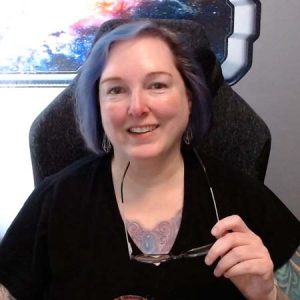
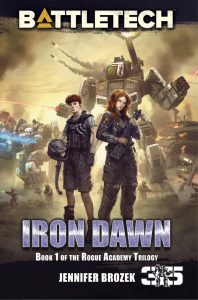
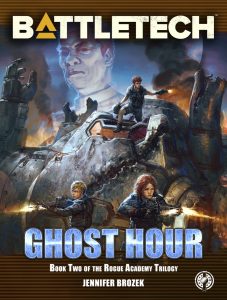
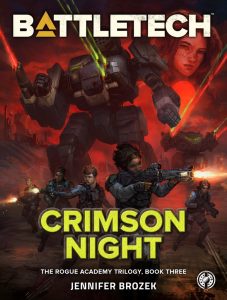
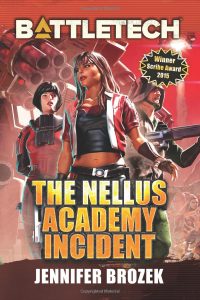
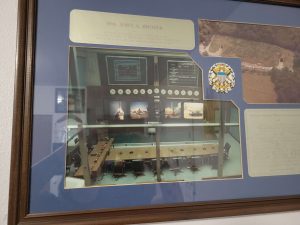
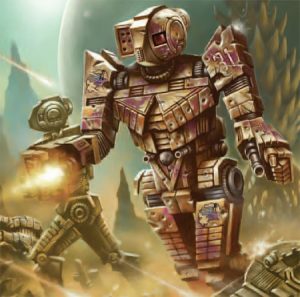
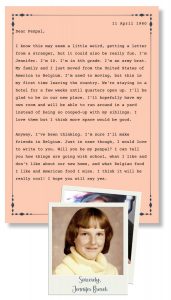
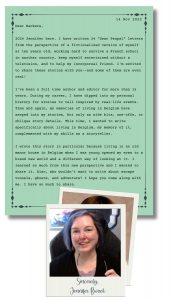
I can relate to the commentary around working and living in a military environment, and growing up in that environment – I think the way the writing around how the characters acted in the BattleTech novels is a reason I liked the Nellus Academy novel so much. I hope we do get a sequel at some point…
Does their sexuality really matter?
Gotta spread The Message no matter what
And that message would be…?
Jennifer is an absolutely incredible writer, and her Rogue Academy books were some of the first I picked up after coming back to BT lore after a long break. She has a real talent with creating relatable characters with genuine emotional reaction to circumstance. Something not a ton of BT writers have managed over the years. It’s was also great to see Ace representation in a series we hadn’t seen it in before, as someone on the Ace spectrum it’s a joy to feel seen in a narrative universe this large.
This was a great interview, thanks for making it happen and giving Jennifer’s work the attention it deserves.